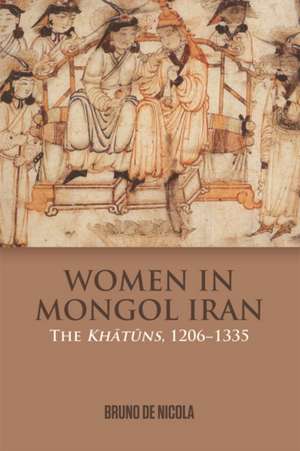Women in Mongol Iran
Autor Bruno De Nicolaen Limba Engleză Paperback – 10 aug 2018
| Toate formatele și edițiile | Preț | Express |
|---|---|---|
| Paperback (1) | 241.73 lei 3-5 săpt. | +25.73 lei 6-12 zile |
| EDINBURGH UNIVERSITY PRESS – 10 aug 2018 | 241.73 lei 3-5 săpt. | +25.73 lei 6-12 zile |
| Hardback (1) | 555.00 lei 6-8 săpt. | |
| EDINBURGH UNIVERSITY PRESS – 24 feb 2017 | 555.00 lei 6-8 săpt. |
Preț: 241.73 lei
Nou
Puncte Express: 363
Preț estimativ în valută:
46.25€ • 48.20$ • 38.30£
46.25€ • 48.20$ • 38.30£
Carte disponibilă
Livrare economică 13-27 martie
Livrare express 26 februarie-04 martie pentru 35.72 lei
Preluare comenzi: 021 569.72.76
Specificații
ISBN-13: 9781474437356
ISBN-10: 1474437354
Pagini: 304
Ilustrații: 15 B/W illustrations
Dimensiuni: 153 x 232 x 19 mm
Greutate: 0.47 kg
Editura: EDINBURGH UNIVERSITY PRESS
ISBN-10: 1474437354
Pagini: 304
Ilustrații: 15 B/W illustrations
Dimensiuni: 153 x 232 x 19 mm
Greutate: 0.47 kg
Editura: EDINBURGH UNIVERSITY PRESS
Notă biografică
Bruno De Nicola (BA Barcelona, MA London, PhD. Cantab.) is Lecturer in the History of the Middle East at Goldsmiths College (University of London). He combines this position with an affiliation to the Institut für Iranistik (Österreichische Akademie der Wissenschaften) in Vienna (Austria). Previously he has been part of the ERC funded project "The Islamisation of Anatolia, c. 1100-1500" (grant number 284076) based at the University of St. Andrews and Project Curator of Persian Manuscripts at the British Library (London). His main area of research is the history of the Mongol Empire, medieval Middle Eastern history and Islamic manuscripts.
Descriere
This book shows the development of women's status in the Mongol Empire from its original homeland in Mongolia up to the end of the Ilkhanate of Iran in 1335.
